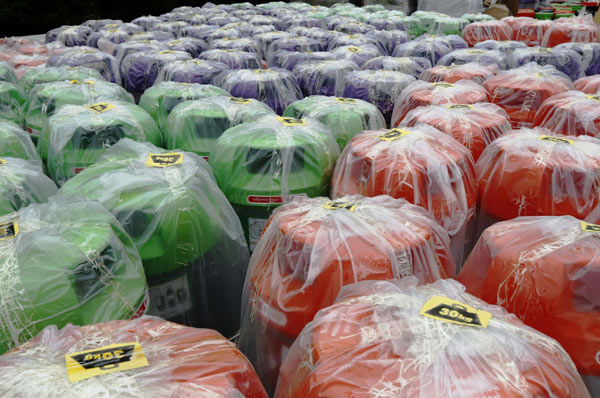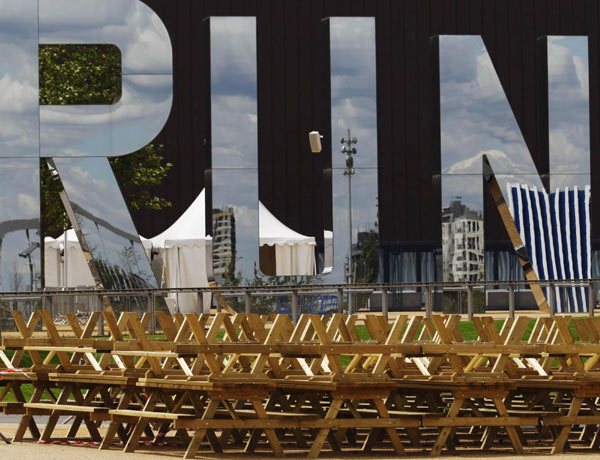London raises bar on greening the Games
 0 Comment(s)
0 Comment(s) Print
Print E-mail China Daily, July 16, 2012
E-mail China Daily, July 16, 2012
 |
|
Packaged recycling waste bins wait to be put out in the London 2012 Olympic Park at Stratford in London, July 12, 2012. [Photo/Agencies] |
A reed warbler sings from her nest, well hidden along the banks of a river that winds through a London park.
But this is not just any urban refuge - it's the Olympic Park, in a once derelict and contaminated area of East London populated by industrial buildings and neglected waterways.
And in just a few weeks' time, millions will watch the greatest Games on Earth in the warbler's backyard.
More than 200 hectares of land have been razed and redeveloped for the 2012 Olympic and Paralympic Games, and 45 of those have been given over to creating new wildlife habitats for a variety of fauna - including kingfishers, bats, otters and grass snakes - while much of the rest has been left as parkland.
The urban park project is one of Europe's biggest in 150 years, according to the Olympic Development Authority (ODA) and the London Organising Committee of the Olympic Games (LOCOG), and is part of ODA's efforts to keep its promise to make the Games the greenest to date.
Thousands of semi-mature trees were planted - aspen, crack willow, holm oak and silver birch - as were hundreds of thousands of wetland plants and other species, and more than 10 hectares of annual and perennial meadows.
An independent commission appointed to review the results, the first commission of its kind, says the outcome has been impressive when compared to previous hosts Beijing, Athens and Sydney, though not everything has worked.
"You only win a gold medal by being better than everyone else," said Shaun McCarthy, chair of the Commission for a Sustainable London 2012, but added: "I can very confidently say that this is the new high-water mark."
Simon Lewis, a campaigner at environmental group WWF UK, agreed London would provide a sustainability blueprint for Olympic Games for years to come.
But he also said progress on putting concern for the environment at the heart of the Olympic movement has been slow.
"It is evolutionary rather than revolutionary," Lewis told Reuters.
 |
|
Picnic tables are stored next to a large mirrored word "RUN" in the London 2012 Olympic Park at Stratford in London, July 12, 2012. [Photo/Agencies] |
Targets
The International Olympic Committee (IOC) encourages host cities to address how they will handle the environmental impact of the Games in their planning, but does not insist on targets - Sydney 2000, Athens 2004 and Beijing 2008 all had environmental plans whose ambition varied widely.
"London 2012 embedded sustainability in its planning from the start," said Emmanuelle Moreau, an IOC spokesman.
The ODA matched or beat most of its sustainable development targets, such as those for carbon emissions, waste and energy efficiency, the independent commission said in a June report.
One target promised a 50 percent reduction in carbon emissions from construction in the Olympic Park compared to levels set out in 2006 building regulations.
Others called for permanent buildings to be at least 15 percent more energy efficient, and for at least 90 percent of demolition waste to be reused or recycled.
Some 2 million tonnes of the area's soil was cleaned on site to remove contaminates such as oil, petrol, tar, arsenic and lead, while London's Velodrome is twice as energy-efficient as it needed to be.
It used half the materials used to build the one in Beijing and also came in comfortably under budget, evidence that greener projects do not need to come with a higher price tag, said McCarthy.
"For me treating sustainability like some sort of premium product, like a pair of designer jeans, is the completely wrong way to look at it," McCarthy added.
Many of the venues, bridges and structures to accommodate an expected 11 million visitors to the London Games can be disassembled, downsized and relocated afterwards.
The IOC's Moreau said a commitment to sustainable development, which gives equal weight to economic growth, the environment and social issues, will continue to be a key requirement in selecting host cities in future.
Rio is already working on ways to cut traffic congestion and reduce emissions ahead of the 2016 Games, and its sustainability team has been in contact with London.
But environmentalists say the IOC should set higher standards and require all future host cities to take on measurable targets. Until that happens, London - they say - is likely to remain the green benchmark by default.
"There is absolutely no reason why the IOC shouldn't be demanding the highest possible standards," McCarthy said.





